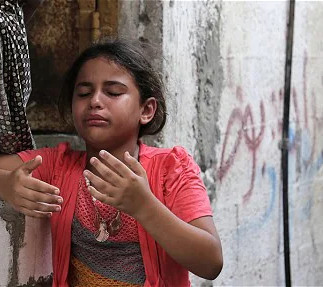Rachel and Aysha | Anti-War Poems
- Chris Zachariou

- Dec 2, 2023
- 2 min read
Updated: Sep 10, 2024
Rachel screams.
A ripping pain mauls
her body but the cruel
abuser has no pity.
Aysha gasps for breath.
The bombs keep falling
and a ton of rubble
crushes her tiny chest.
Rachel and Aysha
holding hands, weep
at the gates of Salem
but the Lord is deaf.
A few words about the poem…
Anti-War Poems | The Tragedy and Hypocrisy within the Conflict Machinery
In the poem "Rachel and Aysha," part of the collection “Anti-War Poems,” the stark verses unfold with an unyielding focus on the senseless nature of armed conflict, a perennial human tragedy that, often, concludes through negotiation rather than a triumph of arms. The agony depicted in the narratives of Rachel and Aysha serves as a poignant reminder of the catastrophic toll war exacts, particularly on the innocent.
The rawness of Rachel's screams and Aysha's final breath serves as a testament to the brutality inflicted upon the vulnerable, highlighting the tragic reality that warfare thrusts upon the young. These verses paint a vivid, unflinching portrait of the profound pain experienced by children caught in the crossfire of conflict. The golden gates of Old Jerusalem, a symbol of antiquity and resilience, stand as silent witnesses to the relentless cycle of violence that persists despite the passage of time.
The narrative further underscores the senseless nature of wars, emphasizing that negotiations, not the relentless march of armies, typically bring about their resolution. It is a reflection on the absurdity that often accompanies armed conflicts, where the ultimate resolution is found not in the triumph of might but in the deliberations around a table.
In contemplating the tragedy of war, it becomes evident that those who bear the brunt of its horrors, particularly the young, are not the architects of such conflicts. The decision-makers, ensconced in positions of power and privilege, seldom experience the ultimate sacrifice demanded by the wars they orchestrate. This glaring asymmetry between those who declare war and those who pay its price serves as a scathing commentary on the inherent injustice embedded in the machinery of armed conflict.
Moreover, the verses implicitly criticize the hypocrisy of superpowers who often resort to proxy wars to further their geopolitical ambitions. This cynical manoeuvring using others as pawns in a deadly game exposes the dissonance between the professed pursuit of justice and the covert pursuit of self-interest. Proxy wars, devoid of any moral high ground, lay bare the manipulation and exploitation at the heart of international power dynamics.
In crafting an anti-war narrative, it is crucial to acknowledge the human cost of conflicts, the disproportionate burden borne by the innocent, and the duplicitous strategies employed by those who wield geopolitical influence. "Rachel and Aysha" becomes a poignant plea against the perpetuation of violence, a call to question the motives behind armed conflicts, and a stark reminder of the urgent need to prioritize diplomacy over the destructive allure of armed warfare.









Comments